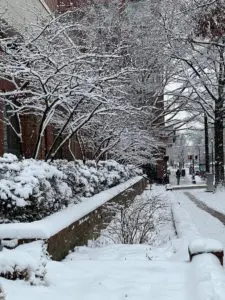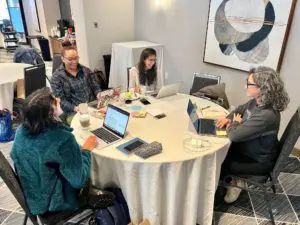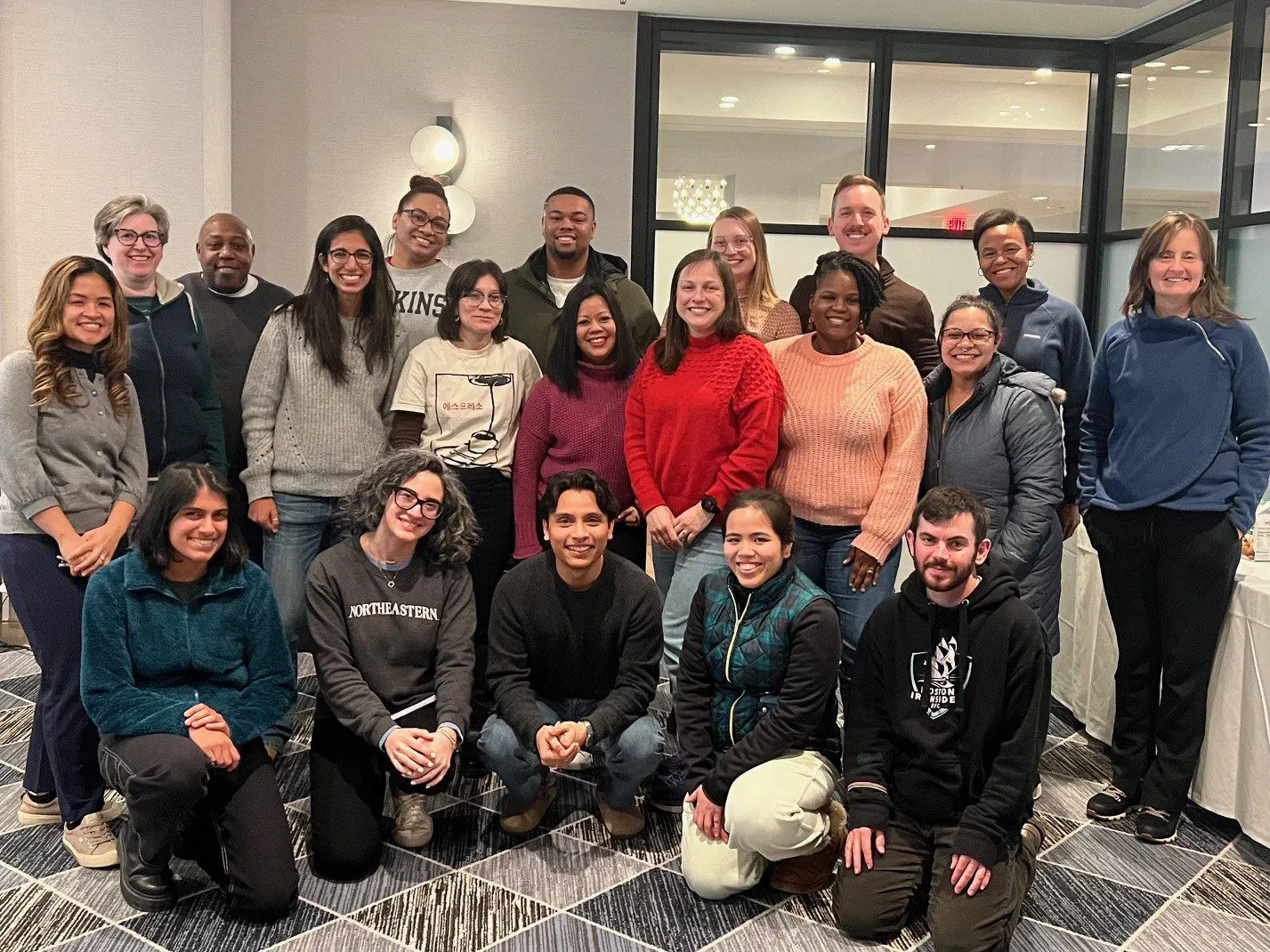Fourteen scholars traveled to attend the 2024 HPRS Winter Writing Retreat. The two-day session allowed scholars to engage in deep conversation with each other and a writing coach about their work.

The snow-covered hotel in Alexandria, Virginia, where the scholars met for the HPRS Winter Writing Retreat.
The age-old affliction of writer’s block was no match for the picturesque setting of Alexandria, Virginia, where HPRS hosted its Winter Writing Retreat in January. Fourteen scholars from across the country made their way to the snow-covered city, spending two days together to work on a writing project of their choice.
Since 2019, HPRS has hosted annual writing retreats to support scholars’ progress on a writing project of their choosing—ranging from publications to dissertations to grant applications and more. It’s also an opportunity to see old friends and build community with new faces from other cohorts.
Creating a Flexible yet Intentional Space
Samyu Comandur (Cohort 2022) had just completed her master’s thesis. Just days after her submission, she was flying to Alexandria, turning her attention to her dissertation proposal.
“It was really my first space to think about the dissertation proposal,” Samyu shared. “It was a completely blank slate. I had an outline, but it was really more of a time for me to formulate my ideas and really think about what I wanted my dissertation prospectus to look like.”
Samyu, whose background is in healthcare access, racial justice, and sexual health, is in her second year of the PhD program at the University of California, Los Angeles. Her research focuses on the important work of escorts at reproductive healthcare clinics, exploring how escorts develop strategies and tactics that can empower and support patients seeking care.
“It was very nice to trust that we would get done (what we set out to do), but to also have the flexibility to do it on our own terms. It felt very self-motivated, because we all knew that we had put away some of our other obligations and distractions to be there,” she said.
Creating and Strengthening Connections
During the retreats, scholars have opportunities to work on their writing projects both one-on-one with an editor and in small groups of two to three with a writing coach. Natalia Coriano-Díaz (Cohort 2022), who was part of Samyu’s writing group, said she benefited from the discussion and exchange of subject matter expertise with members of her group.

A writing group at the HPRS Winter Writing Retreat connects with each other while working on their writing projects.
“We were all into maternal health, women’s health, and/or reproductive health of some sort,” Natalia said. “Hearing what my colleagues had to say, their thoughts or recommendations, and also hearing them talk about their own research—that was very interesting.”
Natalia is a third-year PhD student at Northeastern University in Boston, focusing on population health with a minor in health policy. Hailing from Puerto Rico, Natalia focuses her research on the maternal health of Latinas and Puerto Rican women.
Natalia’s dissertation includes three publishable papers. When she arrived at the retreat, she was struggling to narrow the focus of her third paper. But after two days of being in community, reflecting, and discussing ideas with her peers and the writing coach, she determined that her third paper would investigate if and how value-based payment reform can help improve outcomes for maternal health while reducing costs.
Natalia also shared that for her and other students whose first language is Spanish, finding an equivalent word or expression in English could be a challenge when writing. “We know the expression in Spanish, but we don’t know the expression in English,” she explained. “And we spend a lot of time trying to find that perfect word or phrase to capture what we mean.”
The writing coach said that sometimes it is appropriate to use the Spanish word or expression and to simply include an explanation. “That inclusion of our culture and our language … was very refreshing and I was so happy to hear this,” Natalia said.
Importance of Reflection in the Writing Process
Tevin Middleton (Cohort 2023) is a first-year scholar at the University of Iowa, where he focuses on behavioral and mental health, and education. His primary goal for the writing retreat was to brainstorm an independent research project on school counselors’ competency in addressing social determinants of health.
“It wasn’t about being productive, it wasn’t about leaving with the product; with writing, reflection is really more important,” Tevin said. “Because I was doing a research proposal, I really benefited from reflecting and having soundboards in real time.”
Tevin has firsthand experience navigating K–12 education and addressing the social behavioral needs of students from his time as a school counselor. He found that his writing coach had similar expertise and this shared foundation grounded and strengthened their conversations.
Lasting Habits and Connections
The scholars returned home with new habits that have already improved their writing process and products. Tevin is taking to heart the advice of “just writing” without getting bogged down in early editing. Natalia now recognizes the need to create dedicated time for brainstorming. And Samyu started a writing accountability group with friends to help with goal setting and daily progress. All three scholars remarked on the importance of separating the writing process from the editing process. Beyond the writing, however, for many of the scholars in attendance, being able to connect with colleagues and friends in person was the ultimate highlight.
“It was just really nice to catch up with people,” Samyu said. “HPRS [is] good at identifying people with strong values and commitment. These people are so incredible.”
Tevin said he particularly appreciated the experience because it created moments to connect with others, noting how important this is for wellbeing and self-care. More broadly, he shared that HPRS has also offered the opportunity to engage in “the internal work of understanding self, how you relate that to your work, and how you show up.”
And for some scholars, the retreat was also about reconnecting with themselves. As Samyu said, “It’s a reminder that we’re allowed to do things for ourselves. I’m grateful that HPRS made that possible.”

